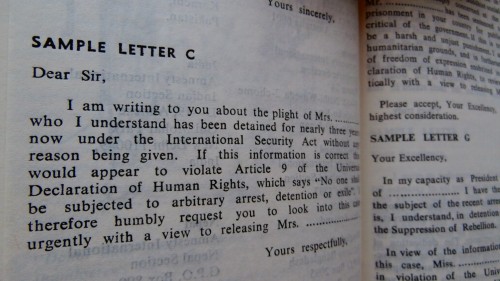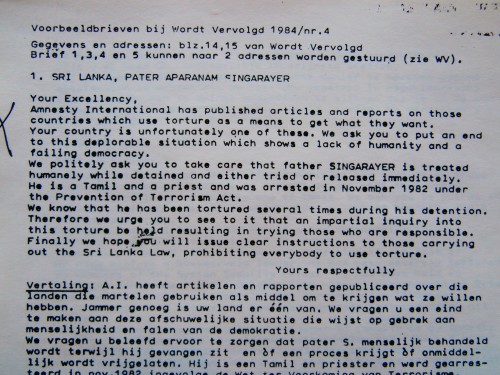Guidelines for letters
It is not easy to write an effective letter for Amnesty International. The organization has produced several brochures and handbooks to make that clear to its members. Here are a few guidelines that have stayed the same during the years.

In order to write a quality letter volunteers need a style guide with example letters, ca. 1970-1989
Courtesy of Archive Amnesty International Netherlands, IISH, Amsterdam
- Write in the language of the addressee. If you are not able to write in this language, try to find a translator or use sample letters. If there is no other option, write in English. A badly written letter is not effective.
-  Be polite. Never use tough language and always show respect for the person you are addressing, even though you don’t agree with his decision. Don’t use phrases like: I demand you to free this prisoner.

A brochure addressed to lawyers with instructions of how to write for demands, 1990s
Courtesy of Archive Amnesty International Netherlands, IISH, Amsterdam
- Make good arguments. Show that you are well-informed. Give detailed information about the prisoner you are writing for. Also show your knowledge of the laws of the prisoner’s country. Mention the Universal Declaration of Human Rights and the vision of Amnesty: people should not be imprisoned when they express their beliefs or political view in a non-violent way.
- Write from your profession. For example, if you are a lawyer or a teacher and you write for somebody with the same profession, mention your profession.
- Do not always mention Amnesty. In some cases, it is better not to write in the name of Amnesty, because the addressee has negative associations with the organization. This information is always provided in the description of the prisoner.
- Â Ask for a reply. In this way, you can check if the letter has been read. When a reply is received, send a copy to the headquarters of Amnesty Netherlands.
Sometimes it was hard for Amnesty to control the quality of sample letters. In June 1984, an Amnesty member from Grouw, Friesland, informed Amnesty Netherlands that she was leaving her writing group, because she did not think the English sample letters they used were appropriate. She found the tone of the letters too harsh. It appeared that these sample letters were written by another Amnesty volunteer, who was contacted about this by Amnesty Netherlands.

 Follow
Follow